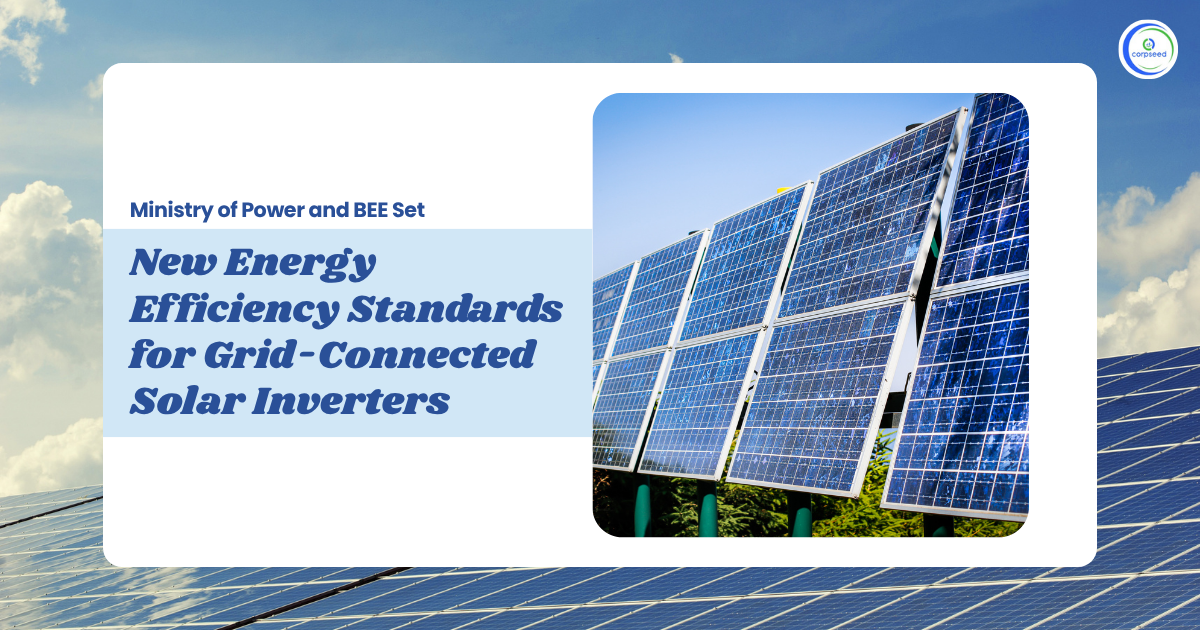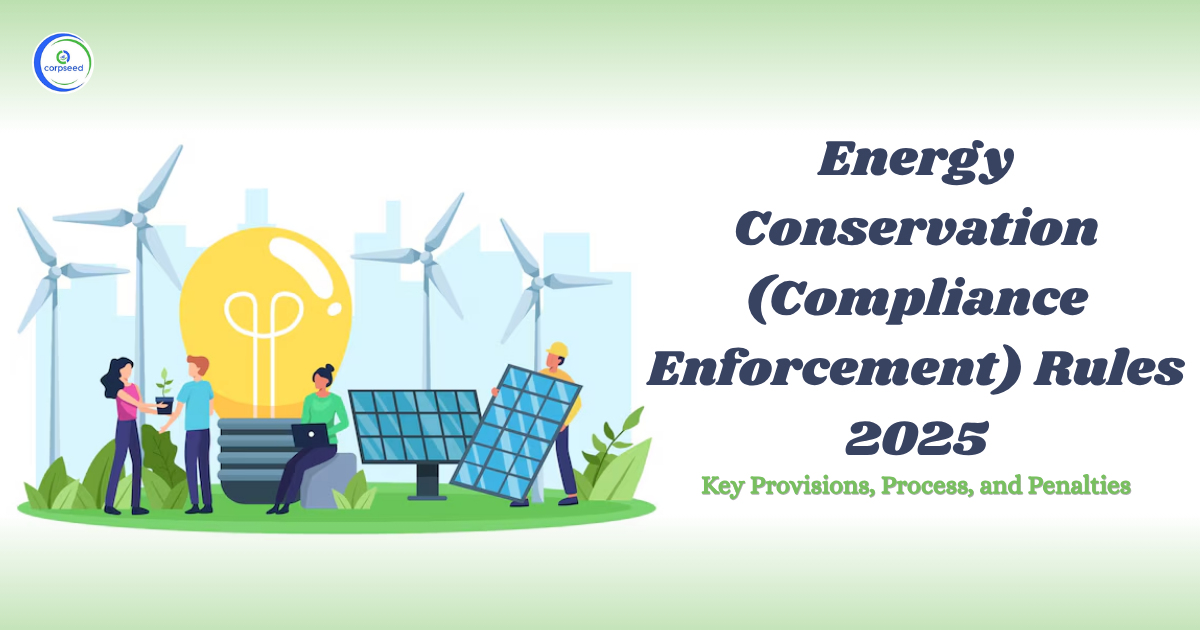The Ministry of Power, in consultation with the Bureau of Energy Efficiency (BEE), issued a new notification on 12 November 2025 to enhance the performance of solar inverters across India. It ensures that all solar inverters manufactured or imported into India have good power efficiency and carry a BEE label. These rules follow IS 17980:2022 and IEC 62891:2020 standards, which help the inverters give better power, stay safe, and last longer. This move aims to promote energy conservation, improve product quality, and support India's renewable energy mission through standardization and transparent efficiency labelling.
Table of Contents
- Purpose of the New Energy Efficiency Standards
- Scope of Application for Grid-Connected Solar Inverters
- Minimum Overall Efficiency Requirement for Solar Inverters
- BEE Endorsement Label and Compliance Conditions
- Testing Methods and Standards for Solar Inverter Efficiency
- Prequalification Criteria for BEE Labelling Programme
- Test Report Format and Certification Requirements
- Key Dates and Implementation Timeline
- Conclusion
--------------Blog Contact Form-------------
Purpose of the New Energy Efficiency Standards
The purpose of this notification is to make solar inverters more efficient and eco-friendly. It aims to:
- Reduce energy loss by improving conversion efficiency between DC and AC power.
- Promote standardization in the Indian solar industry under BEE's guidance.
- Encourage clean energy adoption through reliable and efficient technology.
- Support manufacturers in following international testing norms such as IS 17980:2022 and IEC 62891:2020.
- Enable easy consumer choice with the introduction of a visible BEE endorsement label.
The new energy efficiency standards will help India reduce carbon emissions, enhance solar power output, and ensure every product meets Bureau of Indian Standards (BIS) requirements. It also establishes a transparent labelling mechanism that builds trust between manufacturers, distributors, and consumers, aligning India's solar industry with global best practices.
Scope of Application for Grid-Connected Solar Inverters
The standards apply to all single-phase solar inverters with 230 V AC, 50 Hz output and three-phase inverters up to 415 V AC, 50 Hz, with a rated capacity up to 100 kW. This includes every inverter manufactured or imported into India. The rule applies to grid-connected solar inverters without storage, ensuring they meet the defined efficiency and labelling requirements under IS 17980:2022.
Minimum Overall Efficiency Requirement for Solar Inverters
To get the BEE label, a solar inverter must reach certain efficiency levels. The standards define minimum overall efficiency as follows:
| Rated Output Power (kW) | Minimum Overall Efficiency (%) |
| < 1 | 92% |
| 1 ≤ Power < 3 | 93% |
| 3 ≤ Power < 5 | 95% |
| 5 ≤ Power < 10 | 96% |
| 10 ≤ Power < 20 | 97% |
| > 20 | 98% |
No negative tolerance is allowed. Every inverter tested must meet these minimum values, even after considering manufacturing variations.
BEE Endorsement Label and Compliance Conditions
Each inverter must have a BEE label that shows how well it saves energy. This label makes it easy to spot inverters that use less power. Only inverters that follow BIS rules can join the BEE Standards and Labelling Programme. The endorsement label improves product transparency and supports India's push toward energy-efficient renewable technology.
Testing Methods and Standards for Solar Inverter Efficiency
Testing of solar inverters must follow the IS 17980:2022 / IEC 62891:2020 standards. These include:
- Measurement of static maximum power point tracking (MPPT) efficiency.
- Evaluation of steady-state conversion efficiency under standard test conditions.
- Testing ensures that the overall efficiency values claimed by manufacturers are accurate and meet international benchmarks.
Prequalification Criteria for BEE Labelling Programme
To qualify for the BEE labelling programme, grid-connected solar inverters must:
- Comply with overall efficiency limits.
- Be BIS certified and follow the latest version of IS 17980:2022.
- Meet all safety and quality requirements as per BEE guidelines.
- Undergo testing and verification through an approved lab before applying for the label.
Test Report Format and Certification Requirements
Manufacturers must submit test reports in a format defined by the Ministry of Power. Each report must include details such as:
- Laboratory name and accreditation number.
- Model number, manufacturer details, and rated output.
- Efficiency readings under standard test conditions.
The testing can be performed by NABL-accredited labs, NISE, or other labs recognized by international accreditation bodies like ILAC or APLAC. The process ensures accuracy and consistency across all tested units.
Key Dates and Implementation Timeline
The notification specifies that the standards will be valid from 1 January 2026 to 31 December 2027. During this period, every manufacturer and importer must ensure their grid-connected solar inverters comply with BEE efficiency standards and display the BEE endorsement label. This timeline provides enough time for the industry to align production and testing with the new requirements.
Conclusion
The 2025 notice from the Ministry of Power and the Bureau of Energy Efficiency (BEE) is a big move to make solar inverters in India more efficient. These new rules will make sure that only strong, safe, and energy-saving inverters are sold in the market. Every inverter will carry a BEE label that shows how much energy it can save. This simple label helps people choose inverters that use less power.
Only inverters that meet BIS standards can be part of the BEE Standards and Labelling Programme. This initiative will help in saving power, promoting renewable energy use, and supporting India's commitment to sustainable growth under the Energy Conservation Act, 2001.
This step also helps India become a world leader in solar energy and save power. With simple testing rules, clear labels, and strong efficiency goals, these new rules will help makers build cleaner and more innovative energy products.
This portion of the site is for informational purposes only. The content is not legal advice. The statements and opinions are the expression of author, not corpseed, and have not been evaluated by corpseed for accuracy, completeness, or changes in the law.
BOOK A FREE CONSULTATION
Get help from an experienced legal adviser. Schedule your consultation at a time that works for you and it's absolutely FREE.




.webp)




